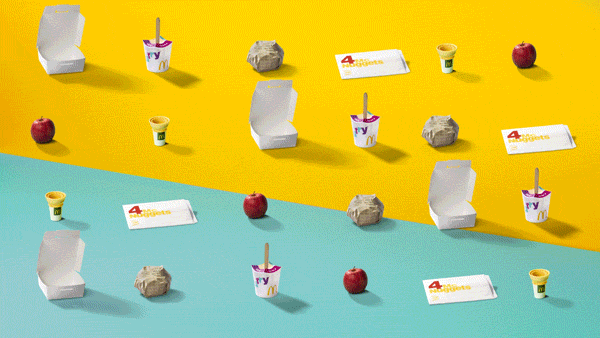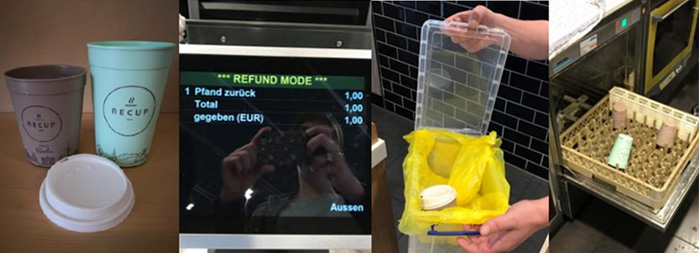McDonald’s is consistently testing eco-friendly packaging inside international stores that could eventually be unleashed across the world. These experiments involve trial and error, and that was certainly the case with last year's test of paper straws in the United Kingdom.
The Chicago-based chain faced backlash after customers complained that the straws dissolved too quickly and were not fully recyclable.
On Thursday, the brand announced new green packaging trials in Europe aimed at fixing the U.K. paper straw problem. Other Scale for Good tests include recycling Happy Meal toys, eliminating McFlurry lids and a reusable cup program in Germany.
“We care about lessening our impact on the environment and know our customers do too,” Keith Kenny, vice president of global sustainability, said in a statement. “That’s why we’re finding new and innovative ways to reduce our use of packaging, switch to more sustainable materials and help our customers to reuse and recycle, too.”
He said the trials are vital in helping McDonald’s “get first-hand feedback” from customers about which solutions work best without compromising on quality.
Here are highlights of each test:

Paper Straws: McDonald’s said "an evolved paper straw" will soon be rolling out across Europe. The fix comes after the chain faced criticism when it launched a paper straw test in the United Kingdom in mid-2018.
Some customers complained that the straws dissolved too quickly or were not fully recyclable.
“Following feedback from customers, and as the packaging industry has evolved, the paper straws being rolled out are now stronger while remaining made of fully recyclable materials,” the company said.
Italy and Portugal markets will only be offering straws on request to cut down material use, the brand added.
McFlurry lids: In Europe, restaurants are serving McFlurry desserts without lids. In France, stores will roll out a new fiber-based lid for all cold drinks.
McDonald’s said the test will be fully rolled out across Europe by the end of 2020. In France, the fiber lids used on all cold drinks are made from 100% certified sustainable sources and recyclable materials.
Some markets are also testing McFlurry spoons made of wooden and paper alternatives. The goal is to find “material that meets customer preferences, operational functionality and sustainability,” McDonald’s said.
Countries removing McFlurry lids include: Austria, Belarus, Belgium, Bosnia, Croatia, Cyprus, Czech Republic, Denmark, Estonia, Finland, France, Georgia, Germany, Greece, Hungary, Ireland, Italy, Latvia, Lithuania, Luxembourg, Malta, Netherlands, Norway, Poland, Portugal, Romania, Russia, Serbia, Slovakia, Slovenia, Spain, Sweden, Switzerland, United Kingdom, Ukraine.
Eliminating lids will reduce plastic use by more than 1,200 tonnes in Europe, the company said.

Clever containers: McDonald’s Germany is piloting a reusable cup program called ReCup. McDonald’s said customers pay a deposit of 1 euro to receive their McDonald’s drink in a reusable carry out cup, which they can return to any restaurant participating in the program. It will be cleaned and reused.
This follows a summer experiment where a store in Berlin went nearly plastic-free for 10 days. During that test, edible waffle cups replaced condiment containers, paper straws replaced plastic straws, wooden cutlery replaced plastic cutlery. Sandwiches were also wrapped in packaging made from grass and Chicken McNuggets were served in paper bags rather than cardboard boxes.
In Ukraine, customers are being served sundaes in a waffle cup, so they can “eat the cup,” McDonald’s said.
Toy Recycling: In the United Kingdom, seven restaurants are launching a toy take back program. Customers can return used Happy Meal toys and other used plastic toys to these restaurants.
This follows a successful and much broader toy recyling program in Japan. In that trial, held earlier this year, Japan restaurants collected 1.27 million toys, which were “reborn” into 100,000 trays.
What's next? McDonald’s said once feedback is collected on all these Scale for Good tests, the chain will determine which options can be “scaled up or adapted” for broader use.
“The model allows McDonald’s to find the sustainable solutions customers want, while delivering the great experience they know and love,” the company said.
Contact Nancy Luna at [email protected]
Follow her on Twitter: @fastfoodmaven
Tags:





